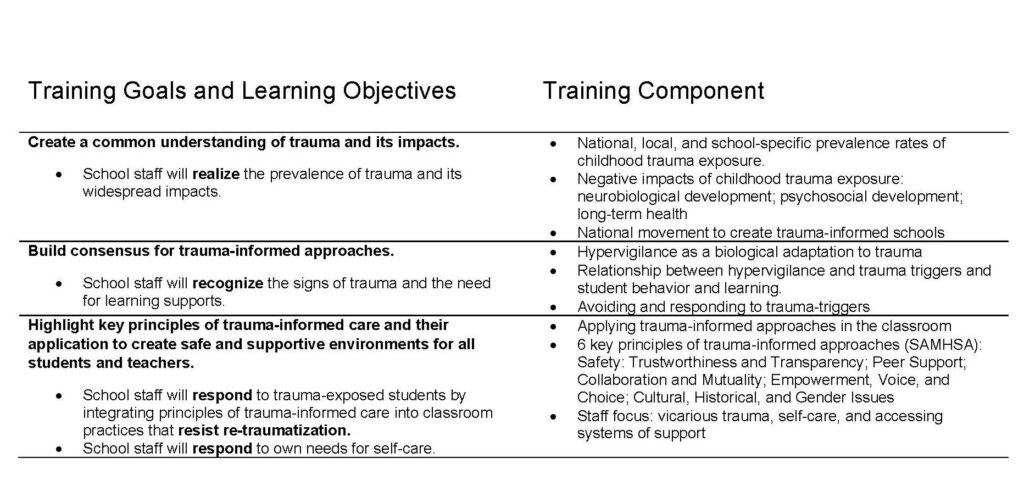One of the key implementation strategies employed by Safe Schools NOLA is engagement with the whole school in shared learning through a one-day foundational professional development training in the core concepts of trauma, the rationale for trauma-informed approaches (including local data on trauma exposure), key principles of trauma-informed care, and the application of these principles to create safe and supportive environments for all students and teachers. The training also introduces the concepts of secondary traumatic stress and the need for staff self-care (see below for Learning Objectives & Training Components). We also developed a shorter, separate foundational PD for school contract personnel (cafeteria workers, janitorial staff, bus drivers).
In preparation for the foundational PD, our team conducts a “cultural audit” of the school, which involves conversations with members of the leadership team and other key personnel (e.g., school social worker or school psychologist) to learn about existing systems related to student support, behavioral expectations, discipline policies, mental health services, and community partnerships. This information helps to customize the training provided to each school so that trauma-informed approaches aren’t seen as an extra add-on to the organizational culture of the school, but instead are viewed as a framework that can be used to integrate, improve, or extend current priorities of the school. This is a critical step in gaining buy-in from school leaders and staff.
Building knowledge about trauma and trauma-informed approaches increases the enthusiasm and motivation of staff to implement the approaches (Han & Weiss, 2005), thus fueling a sense of urgency for the work. Over 450 teachers, support staff, and school leaders participated in this training over the course of the Safe Schools NOLA project. Participants have rated the training highly and perceive trauma-informed approaches to be acceptable and feasible. In addition, significant gains in knowledge and positive attitudes toward trauma-informed approaches have been observed following the training.
Additional shared learning throughout the school year focused on educating school leadership and staff about the strategies necessary to support students exposed to potentially traumatic events. Whole school training focused on three content domains that reflect competencies considered central to most models of trauma-informed care: 1) establishing safe and supportive classroom environments; 2) fostering connected relationships between students and teachers; and 3) building teacher skills to prevent and respond to student triggers that can lead to behavioral escalation and re-victimization. Following each training, teacher consultation and coaching was provided to increase the effectiveness and sustainability of the training (Garet, Porter, Desimone, Birman, & Yoon, 2001) and teachers’ use of specific skills in their classrooms (Noell et al., 2005). This experience allowed teachers and school leaders to understand what additional resources might be needed to implement these strategies effectively over time.
Professional Development materials are available upon request.
For more information please contact Dr. Stacy Overstreet.